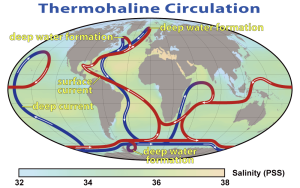Climate Detectives Projects 2023-2024
Project title: L’évolution du climat belge causé par le Gulf Stream.
Collège Saint André Auvelais Belgium
Qu’est-ce que le Gulf Stream, comment évolue-t-il dans le monde et quel impact possède-t-il sur le climat en Belgique ?
Our project was to identify how the world’s climate works, but particularly in our home country (Belgium). Initially, we didn’t know very much about how the climate works. So, we decided to research the project to try and understand it. We came across the Earth’s “thermohaline circulation” and the famous Gulf Stream. So, we learned about this natural phenomenon to understand the Belgian climate. So, our aim is to describe what the Gulf Stream is, how it works and what it causes, thanks to the many satellite data at our disposal. The Gulf Stream is an important factor in the climate of Europe, and Belgium in particular. It enables our small country to live in a continental climate without heavy snowfalls in winter and extreme heatwaves in summer. It is also at the heart of a very important discussion, as it has been undergoing significant changes over the years. In fact, it’s slowing down more and more, and that’s something very worrying. We’re going to talk about these changes, what they mean and the consequences for the future of the climate in general and in Belgium. This is a very important event in our country’s history, because it affects us so closely. We need to keep abreast of the conditions of our wonderful climate so that we can preserve it. We need to protect our planet and preserve our habitat for the future!
Qu’est-ce que le Gulf Stream, comment évolue-t-il dans le monde et quel impact possède-t-il sur le climat en Belgique ?
The evolution of the Gulf Stream isn’t going in a positive direction, and could be slowing down, according to a few studies. Indeed, the Gulf Stream is slowing down due to global warming and has lost the stability it has maintained for centuries. It is cooling as ice melts from the Arctic and Greenland, bringing freshwater from these icy zones to the warm waters of Western Europe where it mixes. This phenomenon induces a drop in temperature, cooling Europe’s warm waters instead of bringing them here to regulate the climate of European regions. The slowing of the Gulf Stream has a direct impact on Belgian coast, as it runs along the European coastline. In addition, with this mixture of fresh waters, the water will become less salty, which in turn means a drop in density, and it will take longer for the water to sink to the bottom and move southwards again. Through satellite and in situ data from 1990 to 2024, we observe that all the signs of the Gulf Stream’s slowdown are present: decreasing salinity, decreasing temperature and decreasing water density. In fact, if we consider the East Coast of North America, and Western Europe, we see a downward trend in all these elements. In the space of 30 years, water salinity has gone from 34.5 33.1. Compared with the east coast of the USA, salinity has a stadium trend and is higher and lower (36) than in Europe, although subsequently, towards 2010-2024, it is decreasing sharply to values of 35.5. Furthermore, using in situ data, we observe that in these 2 continents, salinity is higher at the surface than at depth. As for temperature, we can see that there has been an increase of over 4 degrees over 30 years. Finally, surface water density has also been on a downward trend since 2011.
The slowing of the Gulf Stream could have major climatological consequences for Western Europe, such as colder winters, summer heat waves and more frequent storms. Added to this is a significant rise in sea levels, which would affect coastal populations. What’s more, Belgium lies close to sea level, so we won’t be spared from this, which could lead to severe flooding. This change is very sudden and far too rapid, which could lead to significant changes and irreversible effects. Our continental climate would never be the same again. But what can we do to change that? To avoid, we need to increase the time of slowdown of the activity of the Gulf Stream, we must decrease the global warming. For this, different countries must reduce their production of CO2 and other gases. One solution would be to make businesses greener by reducing their creation of all types of waste or even decreasing meat consumption, thus reducing livestock. Another proposal is to use lower carbon energies. As can be seen in Brazil with a football stadium illuminated by the movements of the players who create kinetic energy that is used to provide electricity. This happens with the help of artificial lawns made of recycled materials.
Projects are created by the teams and they take the full responsibility of the shared data.
← All projects



